Compare Bupropion with Other Antidepressants and Smoking Cessation Options
Antidepressant & Smoking Cessation Comparison Tool
Personalized Treatment Recommendation
This tool helps you compare treatment options based on your specific goals, concerns, and medical history. Input your preferences below and get tailored recommendations based on the latest clinical evidence.
Treatment Recommendations
Recommended Options
When you’re trying to find the right treatment for depression or to quit smoking, Bupropion often comes up. It’s sold under brand names like Wellbutrin and Zyban, and it’s not like most other antidepressants. While drugs like Prozac or Zoloft boost serotonin, Bupropion works on dopamine and norepinephrine. That difference matters - it affects how you feel, what side effects you get, and whether it works for your situation.
How Bupropion Actually Works
Bupropion is classified as a norepinephrine-dopamine reuptake inhibitor, or NDRI. That means it keeps more of these two brain chemicals active for longer. Most other antidepressants, like SSRIs (selective serotonin reuptake inhibitors), focus almost entirely on serotonin. Serotonin helps with mood, but it’s also tied to sexual function, sleep, and appetite. That’s why people on SSRIs often report weight gain, low libido, or feeling emotionally numb.
Bupropion doesn’t usually cause those issues. In fact, many users say they feel more alert, motivated, and even lose a little weight. That’s why it’s often chosen for people who’ve had bad reactions to SSRIs, or those who want to quit smoking. The FDA approved it for smoking cessation in 1997 under the name Zyban, based on clinical trials showing it doubled quit rates compared to placebo.
Top Alternatives to Bupropion
If Bupropion isn’t working, or you’re worried about side effects, there are several other options. Here are the most common ones, broken down by type.
SSRIs: The Most Prescribed Antidepressants
Fluoxetine (Prozac), sertraline (Zoloft), escitalopram (Lexapro), and citalopram (Celexa) are all SSRIs. They’re the first-line treatment for depression in most guidelines, including those from the American Psychiatric Association. They’re generally safe, well-studied, and effective for about 60-70% of people.
But here’s the catch: up to 40% of users report sexual side effects, and weight gain is common after 6-12 months. A 2023 meta-analysis in The Lancet Psychiatry found SSRIs caused an average 2.5% increase in body weight over a year. If you’re already struggling with weight or have a history of low libido, SSRIs might make things worse.
SNRIs: A Middle Ground
Venlafaxine (Effexor) and duloxetine (Cymbalta) are serotonin-norepinephrine reuptake inhibitors. They hit both serotonin and norepinephrine, so they’re a bit closer to Bupropion than SSRIs are. They can be more effective for severe depression or chronic pain, which is why doctors sometimes prescribe them for patients who don’t respond to SSRIs.
But SNRIs come with their own trade-offs. They can raise blood pressure, cause nausea, and lead to withdrawal symptoms if stopped too quickly. A 2022 study in JAMA Psychiatry showed 18% of patients on venlafaxine had to stop due to side effects - higher than Bupropion’s 12%.
Other NDRI Options
Bupropion is the only NDRI widely available in the U.S., but vortioxetine (Trintellix) is sometimes grouped with it because it also affects dopamine, though indirectly. Vortioxetine is technically an SSRI with multimodal activity, and it’s designed to improve both mood and cognitive symptoms like trouble concentrating. It’s more expensive than Bupropion and not typically used as a first option.
For Smoking Cessation: What Else Works?
If your goal is quitting smoking, Bupropion isn’t your only choice. Varenicline (Chantix) is actually more effective. A 2024 Cochrane Review found that Chantix doubled the chances of quitting compared to placebo, and was about 25% more effective than Bupropion after 6 months.
But Chantix comes with warnings. The FDA has issued a boxed warning for possible mood changes, including suicidal thoughts. That’s why doctors usually avoid it for people with a history of depression or anxiety. Bupropion is often preferred in these cases because it can treat both depression and nicotine addiction at the same time.
There’s also nicotine replacement therapy - patches, gum, lozenges. These don’t work as well alone, but when combined with Bupropion, quit rates go up even more. A 2023 study in Annals of Internal Medicine showed a 32% success rate at 6 months with the combo, compared to 21% with Bupropion alone.
Side Effects: What You Might Actually Experience
Let’s cut through the marketing. Everyone lists side effects, but here’s what people actually report in real life.
- Bupropion: Dry mouth, insomnia, headache, jitteriness. About 1 in 10 people say they feel too wired. Seizure risk is low (under 0.1%) but increases with doses over 450 mg/day or if you have a history of seizures or eating disorders.
- SSRIs: Sexual dysfunction (up to 70% in some studies), weight gain, drowsiness, nausea. Some people feel emotionally flat - like they’re going through the motions.
- SNRIs: Nausea, increased blood pressure, sweating, dizziness. Withdrawal can feel like flu symptoms if you stop suddenly.
- Varenicline: Vivid dreams, nausea, mood swings. Some users report feeling depressed or anxious, even if they didn’t before.
One key point: Bupropion is less likely to cause weight gain than SSRIs or SNRIs. In fact, a 2021 analysis in Psychiatry Research found patients on Bupropion lost an average of 1.3 kg over 12 weeks. That’s not a lot, but it’s the opposite of what happens with most antidepressants.
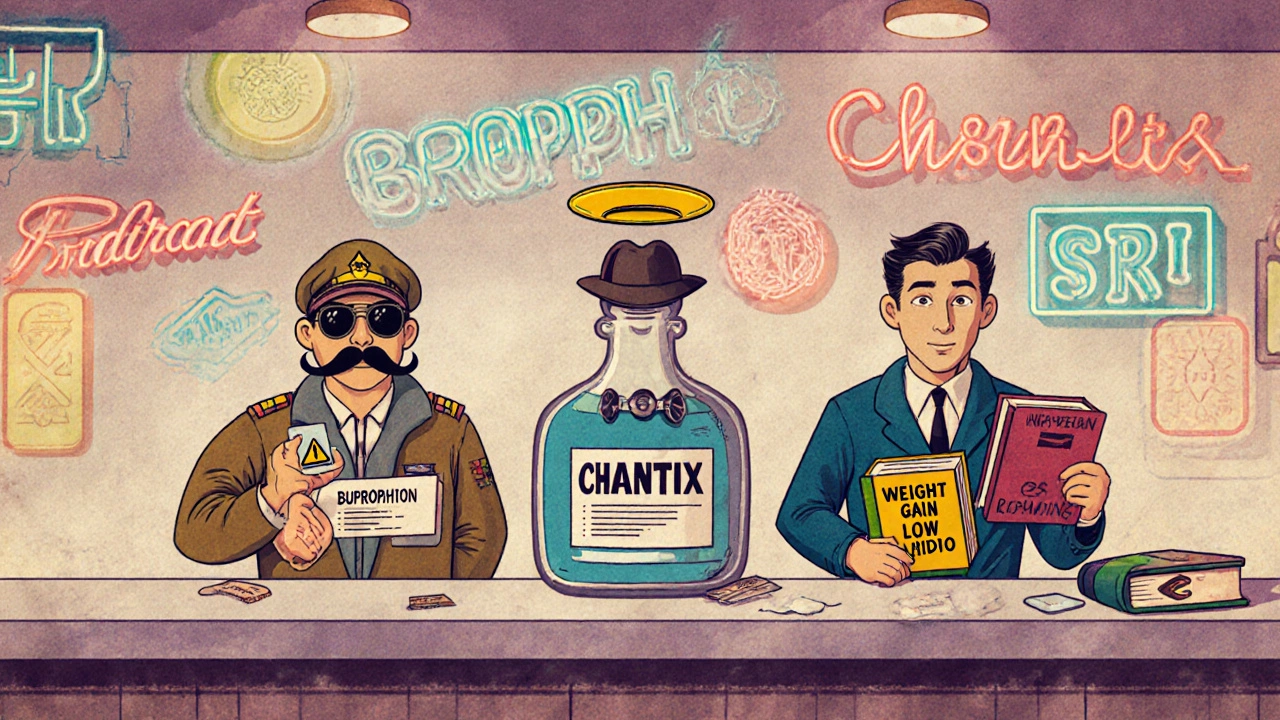
Who Should Avoid Bupropion?
Bupropion isn’t for everyone. You should not take it if:
- You have a seizure disorder or history of seizures
- You have an eating disorder like anorexia or bulimia (risk of seizures increases)
- You’re taking MAO inhibitors (must wait 14 days after stopping an MAOI before starting Bupropion)
- You’re allergic to Bupropion or its ingredients
Also, if you’re pregnant or breastfeeding, talk to your doctor. There’s limited data, but some studies suggest Bupropion may be safer than SSRIs during pregnancy - though not risk-free. The decision should be made case by case.
When to Choose Bupropion Over Others
Here’s when Bupropion usually wins:
- You’re depressed and also want to quit smoking
- You’ve tried SSRIs and had sexual side effects or weight gain
- You feel sluggish and need more energy - Bupropion can feel like a mild stimulant
- You have seasonal depression (SAD) - Bupropion XL is FDA-approved for this
- You’re concerned about weight or libido
It’s also a good option if you’re a man or woman who’s had trouble with other antidepressants. Studies show women respond well to Bupropion for depression linked to hormonal changes, like postpartum or perimenopausal depression.
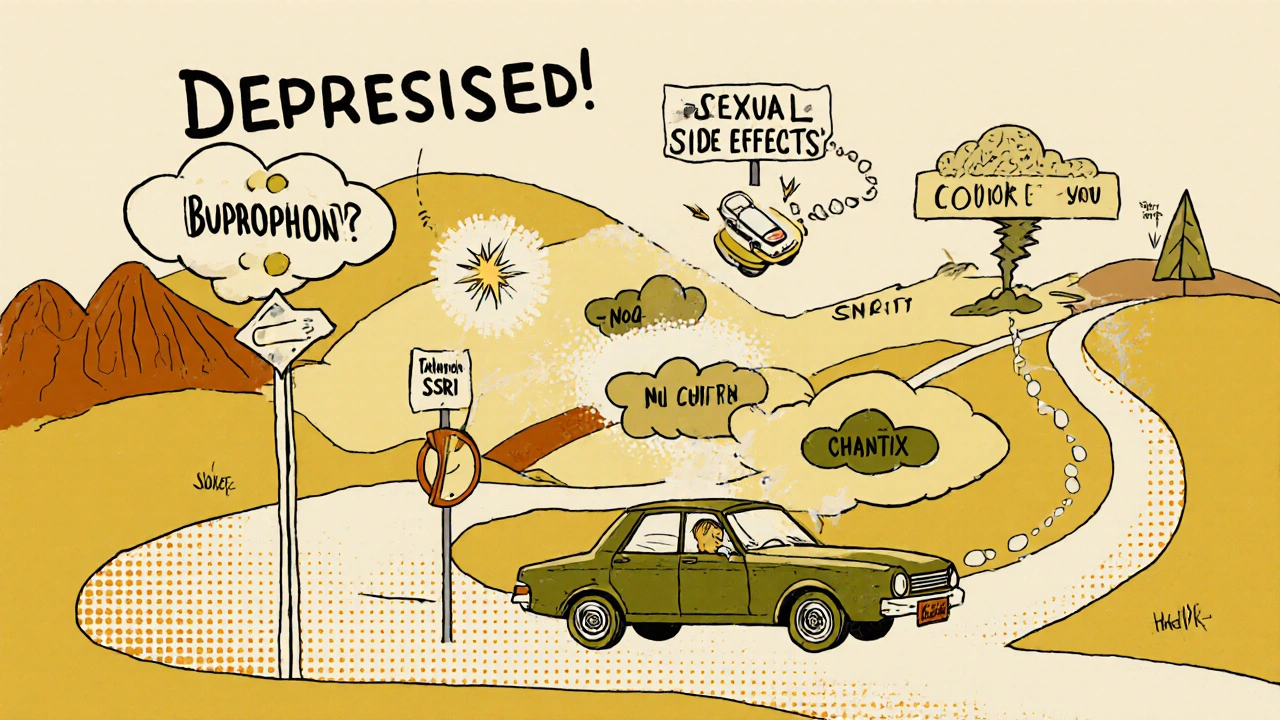
Cost and Accessibility
Bupropion is generic and cheap. A 30-day supply of 150 mg extended-release tablets costs about $10-$15 without insurance. Brand-name Wellbutrin XL can run $200+, but most people don’t need it.
Compare that to varenicline (Chantix), which costs $150-$250 for a full course. SSRIs like sertraline are also generic and low-cost, but if you need to switch multiple times because of side effects, the hidden cost adds up - missed work, therapy visits, lost sleep.
Insurance usually covers all of these, but prior authorization is sometimes needed for Chantix or SNRIs. Bupropion rarely requires it.
Real-World Outcomes: What Works Best?
A 2024 study tracking 12,000 adults in primary care over 18 months found:
- 68% of people on SSRIs saw improvement in depression symptoms
- 65% on Bupropion improved
- 71% on SNRIs improved
- But only 42% of SSRI users stayed on their medication after 6 months - compared to 58% on Bupropion
Why the drop-off? Side effects. People stopped SSRIs because of low sex drive or weight gain. They stopped SNRIs because of nausea or high blood pressure. Bupropion users stayed on because they felt better - not just less sad, but more alive.
For smoking cessation, the same study showed:
- 21% quit with Bupropion alone
- 26% quit with Chantix
- 32% quit with Bupropion + nicotine patch
So if you’re serious about quitting, combining treatments works best.
Final Decision Guide
Still unsure? Use this simple flow:
- Are you trying to quit smoking? → Try Bupropion alone or with a patch. If that doesn’t work after 8 weeks, talk to your doctor about Chantix.
- Do you have low libido or gained weight on other antidepressants? → Bupropion is your best bet.
- Do you have chronic pain or severe anxiety along with depression? → SNRIs might be better.
- Are you new to antidepressants and have no side effect concerns? → SSRIs are still the standard first choice.
There’s no universal best drug. It’s about matching the medicine to your body, your goals, and your life.
Is Bupropion better than SSRIs for depression?
It depends. SSRIs work slightly better for severe depression, but Bupropion has fewer sexual side effects and doesn’t cause weight gain. If you’ve had bad reactions to SSRIs, Bupropion is often the next step. About 60% of people who don’t respond to SSRIs find relief with Bupropion.
Can I take Bupropion and an SSRI together?
Yes, some doctors prescribe them together - this is called augmentation. It’s often done when someone hasn’t improved on an SSRI alone. Studies show this combo can boost response rates by 20-30%. But it increases the risk of seizures and serotonin syndrome, so it’s only done under close supervision.
Does Bupropion help with anxiety?
It can, but it’s not the first choice. Bupropion doesn’t calm the nervous system like SSRIs or SNRIs do. For people with panic disorder or generalized anxiety, SSRIs are usually preferred. But if your anxiety comes with low energy or fatigue, Bupropion might help by boosting motivation and alertness.
How long does it take for Bupropion to work?
Most people notice changes in energy and motivation within 1-2 weeks. Full antidepressant effects usually take 4-6 weeks. For smoking cessation, it’s recommended to start taking it 1-2 weeks before your quit date so it’s in your system when you stop.
Can I drink alcohol while on Bupropion?
It’s best to avoid alcohol. Bupropion lowers your seizure threshold, and alcohol increases that risk. Even moderate drinking can be dangerous, especially if you’re taking higher doses. If you do drink, keep it to one drink occasionally and never binge.

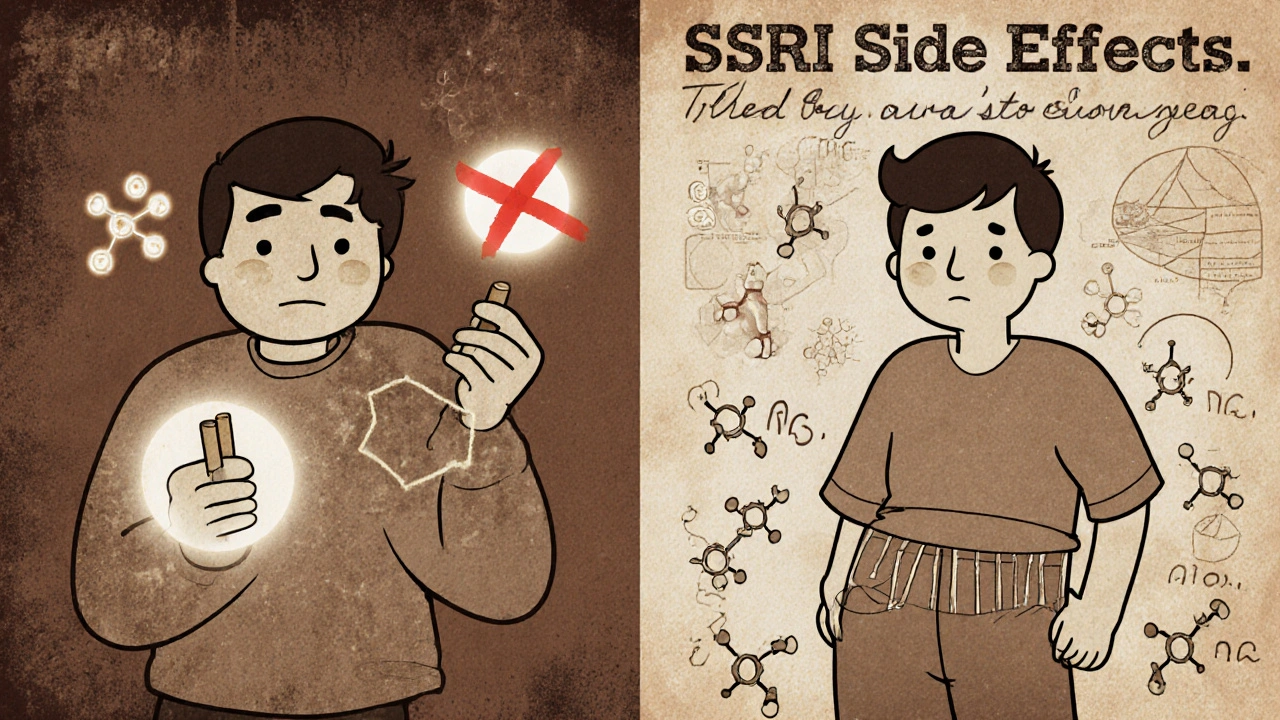
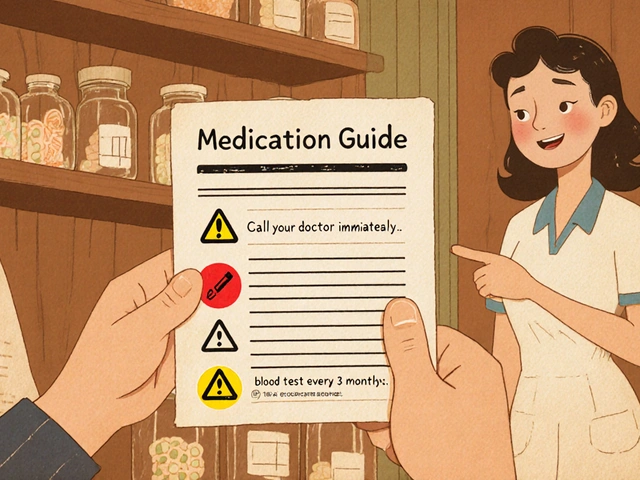
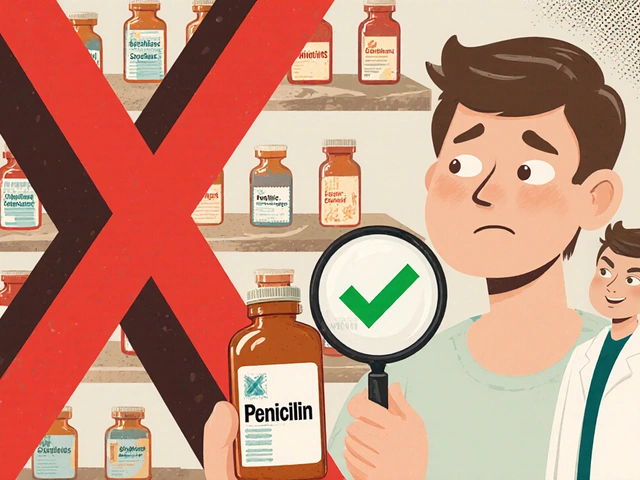

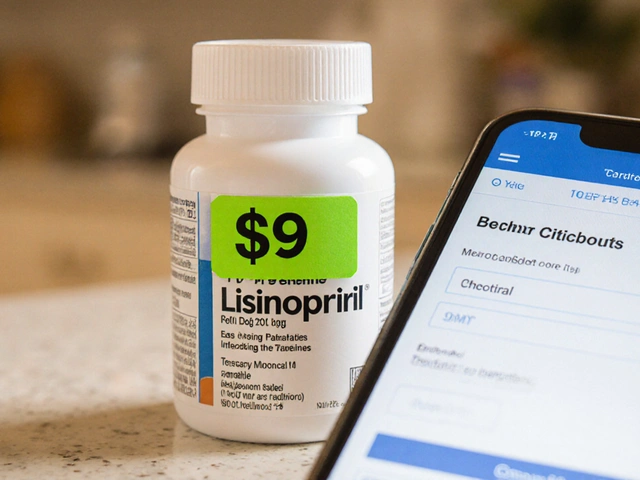

12 Comments
Joe Puleo
October 28, 2025 at 06:40
Bupropion was a game changer for me after SSRIs wiped out my sex drive and made me feel like a zombie. I lost 5 lbs in a month without trying. No more crying over cereal. Just woke up and actually wanted to do stuff. Been on it 18 months. No seizures. No drama. Just me, slightly more awake.
Meredith Poley
October 28, 2025 at 09:41
Of course it doesn’t cause weight gain. It’s basically Adderall with a prescription label. You think that’s a feature? It’s a red flag. Your brain’s not supposed to be running on caffeine and spite forever.
Andrea Swick
October 30, 2025 at 07:56
I tried Bupropion after Zoloft turned me into a sleepy potato with zero interest in anything. The insomnia was brutal at first, but after two weeks I felt like I could breathe again. Not happy, not euphoric-just present. Like someone finally turned the lights on in a dark room. I still have days where I’m tired, but now I can name it instead of just drowning in it. That’s worth it.
Keith Bloom
October 31, 2025 at 20:14
lol so bupropion is the ‘cool kid’ antidepressant now? everyone’s like ‘oh i lost weight’ ‘oh i’m so motivated’ yeah sure. what about the 3 people in every 100 who get seizures from it? or the ones who turn into rage monsters? nobody talks about that. the pharma ads are lying. you’re just a lab rat with a better wifi connection.
Ben Jackson
November 1, 2025 at 06:08
Chantix works better but the mood side effects scared me off. I’ve got anxiety already-didn’t need the FDA warning screaming at me from the bottle. Bupropion + patch was the sweet spot. Quit after 3 weeks. No nightmares. No crying in the shower. Just… freedom. And I didn’t need to be a saint to make it work.
Bhanu pratap
November 2, 2025 at 18:06
In India, we don’t have access to all these fancy drugs. But when I got Bupropion through a friend’s cousin’s pharmacy, it changed everything. I was depressed, overweight, smoking 2 packs a day. Now I run 5k every morning. I don’t need to smoke. I don’t need to cry. I just… live. Thank you science. Thank you medicine. You saved me.
jackie cote
November 4, 2025 at 03:45
Don’t let the hype fool you. Bupropion isn’t magic. It’s a tool. Works for some, doesn’t for others. If you’re looking for a quick fix, you’ll be disappointed. But if you’re willing to pair it with therapy, sleep hygiene, and actual lifestyle changes? It can be the spark. Not the fire. The spark.
Ikenga Uzoamaka
November 5, 2025 at 14:25
Why is everyone ignoring the fact that Bupropion is cheaper than coffee? I pay $12 for 30 pills. My SSRI was $90. I’m not rich. I work two jobs. I can’t afford to be ‘treated’ like a rich person’s problem. Bupropion? It’s the only one that didn’t make me feel like I was paying for my mental health with my dignity.
Mathias Matengu Mabuta
November 6, 2025 at 13:21
It’s fascinating how the medical establishment has elevated Bupropion to a ‘lifestyle drug’ while dismissing SSRIs as ‘emotional suppressants.’ This is not pharmacology. This is cultural narrative engineering. The same people who tout dopamine as the ‘motivation molecule’ are the ones who profit from selling productivity culture. Bupropion is capitalism in a pill.
Lee Lee
November 7, 2025 at 20:59
Did you know the FDA approved Bupropion for smoking cessation based on a trial where 30% of participants were given placebos that were actually sugar pills with a fake label? The real data was buried. And now we’re told it’s ‘evidence-based.’ Wake up. The system doesn’t care if you live. It cares if you buy.
John Greenfield
November 8, 2025 at 14:53
SSRIs cause weight gain? Bupropion causes insomnia? So what? You think depression is a spa day? If you’re too fragile to handle a little jitteriness or a few extra pounds, maybe you need to stop pretending medication is a cure and start dealing with your life. You’re not broken. You’re just bored.
Joe Puleo
November 9, 2025 at 08:55
Just wanted to say-your comment about capitalism in a pill? That’s heavy. But I get it. I used to think the same. Then I got sober, started therapy, and realized: even if the system’s rigged, I still get to choose how I use the tools. Bupropion didn’t fix me. But it gave me the space to fix myself. That’s enough.